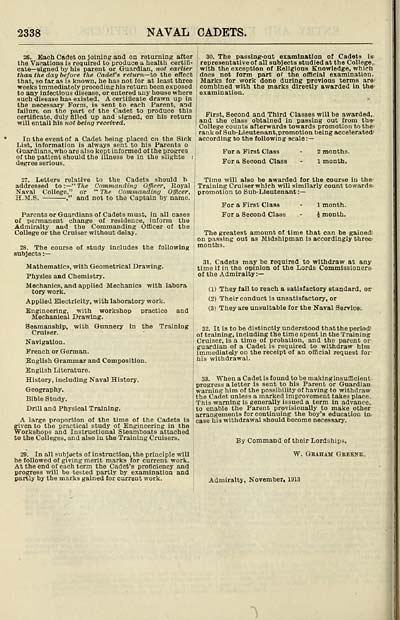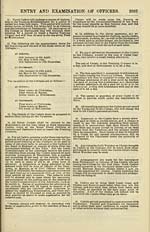Navy lists > Quarterly > 1918 > October
(1934)
Download files
Complete book:
Individual page:
Thumbnail gallery: Grid view | List view

2338
NAVAL CADETS.
26. Bach Cadet on joining and on returning after
the Vacations is required to produce a health certifi-
cate—signed by his parent or Guardian, not earlier
than the day before the Cadet's return— to the effect
that, so far as is known, he has not for at least three
weeks immediately preceding his return been exposed
to any infectious disease, or entered any house where
such disease has existed. A certificate drawn up in
the necessary Form, is sent to each Parent, and
failure on the part of the Cadet to produce this
certificate, duly filled up and signed, on his return
will entail his not being received.
In the event of a Cadet being placed on the Sick
List, information is always sent to his Parents o
Guardians, who are also kept informed of the progres
of the patient should the illness be in the slighte
degree serious.
30. The passing-out examination of Cadets is
■ representative of all subjects studied at the College,.
with the exception of .Religious Knowledge, which
( does not form part of the official examination.
Marks for work done during previous terms are'
| combined with the marks directly awarded in the
examination.
First, Second and Third Classes will be awarded,
and the class obtained in passing out from the-
College counts afterwards towards promotion to the
rank of Sub-Lieutenant,promotion being accelerated-
according to the following scale: —
For a First Class
For a Second Class
2 months.
1 month.
27. Letters relative to the Cadets should b
addressed to :— " The Commanding Officer, Royal
Naval College," or " The Commanding Officer,
H.M.S. ," and not to the Captain by name.
Parents or Guardians of Cadets must, in all cases
of permanent change of residence, inform the
Admiralty and the Commanding Officer of the
College or the Cruiser without delay.
28. The course of study includes the following
subjects :—
Mathematics, with Geometrical Drawing.
Physics and Chemistry.
Mechanics, and applied Mechanics with labora
tory work.
Applied Electricity, with laboratory work.
Engineering, with workshop practice and
Mechanical Drawing.
Seamanship, with Gunnery In the Training
Cruiser.
Navigation.
French or German.
English Grammar and Composition.
English Literature.
History, including Naval History.
Geography.
Bible Study.
Drill and Physical Training.
A large proportion of the time of the Cadets is
given to the practical study of Engineering in the
Workshops and Instructional Steamboats attached
to the Colleges, and also in the Training Cruisers.
29. In all subjacts of instruction, the principle will
be followed of giving merit marks for current work.
At the end of each term the Cadet's proficiency and
progress will be tested partly by examination and
partly by the marks gained for current work.
Time will also be awarded for the course in the-
Training Cruiser which will similarly count towards,
promotion to Sub-Lieutenant :—
For a First Class
For a Second Class
1 month.
i month.
The greatest amount of time that can be gained-
on passing out as Midshipman is accordingly three-
months.
31. Cadets may be required to withdraw at any
time if in the opinion of the Lords Commissioners-
of the Admiralty:—
(1) They fail to reach a satisfactory standard, oc-
(2) Their conduct is unsatisfactory, or
(3) They are unsuitable for the Naval Service;
32. It is to be distinctly understood that the period'
of training, including the time spent in the Training
Cruiser, is a time of probation, and the parent or
guardian of a Cadet is required to withdraw him
immediately on the receipt of an official request for-
his withdrawal.
33. When a Cadet is found to be makinginsufficient .
progress a letter is sent to his Parent or Guardian
warning him of the possibility of having to withdraw
the Cadet unless a marked improvement takes place.
This warning is generally issued a term in advance,
to enable the Parent provisionally to make other
arrangements for continuing the boy's education ia
case his withdrawal should become necessary.
By Command of their Lordships,
W. Graham Gbeene..
Admiralty, November, 1913
NAVAL CADETS.
26. Bach Cadet on joining and on returning after
the Vacations is required to produce a health certifi-
cate—signed by his parent or Guardian, not earlier
than the day before the Cadet's return— to the effect
that, so far as is known, he has not for at least three
weeks immediately preceding his return been exposed
to any infectious disease, or entered any house where
such disease has existed. A certificate drawn up in
the necessary Form, is sent to each Parent, and
failure on the part of the Cadet to produce this
certificate, duly filled up and signed, on his return
will entail his not being received.
In the event of a Cadet being placed on the Sick
List, information is always sent to his Parents o
Guardians, who are also kept informed of the progres
of the patient should the illness be in the slighte
degree serious.
30. The passing-out examination of Cadets is
■ representative of all subjects studied at the College,.
with the exception of .Religious Knowledge, which
( does not form part of the official examination.
Marks for work done during previous terms are'
| combined with the marks directly awarded in the
examination.
First, Second and Third Classes will be awarded,
and the class obtained in passing out from the-
College counts afterwards towards promotion to the
rank of Sub-Lieutenant,promotion being accelerated-
according to the following scale: —
For a First Class
For a Second Class
2 months.
1 month.
27. Letters relative to the Cadets should b
addressed to :— " The Commanding Officer, Royal
Naval College," or " The Commanding Officer,
H.M.S. ," and not to the Captain by name.
Parents or Guardians of Cadets must, in all cases
of permanent change of residence, inform the
Admiralty and the Commanding Officer of the
College or the Cruiser without delay.
28. The course of study includes the following
subjects :—
Mathematics, with Geometrical Drawing.
Physics and Chemistry.
Mechanics, and applied Mechanics with labora
tory work.
Applied Electricity, with laboratory work.
Engineering, with workshop practice and
Mechanical Drawing.
Seamanship, with Gunnery In the Training
Cruiser.
Navigation.
French or German.
English Grammar and Composition.
English Literature.
History, including Naval History.
Geography.
Bible Study.
Drill and Physical Training.
A large proportion of the time of the Cadets is
given to the practical study of Engineering in the
Workshops and Instructional Steamboats attached
to the Colleges, and also in the Training Cruisers.
29. In all subjacts of instruction, the principle will
be followed of giving merit marks for current work.
At the end of each term the Cadet's proficiency and
progress will be tested partly by examination and
partly by the marks gained for current work.
Time will also be awarded for the course in the-
Training Cruiser which will similarly count towards,
promotion to Sub-Lieutenant :—
For a First Class
For a Second Class
1 month.
i month.
The greatest amount of time that can be gained-
on passing out as Midshipman is accordingly three-
months.
31. Cadets may be required to withdraw at any
time if in the opinion of the Lords Commissioners-
of the Admiralty:—
(1) They fail to reach a satisfactory standard, oc-
(2) Their conduct is unsatisfactory, or
(3) They are unsuitable for the Naval Service;
32. It is to be distinctly understood that the period'
of training, including the time spent in the Training
Cruiser, is a time of probation, and the parent or
guardian of a Cadet is required to withdraw him
immediately on the receipt of an official request for-
his withdrawal.
33. When a Cadet is found to be makinginsufficient .
progress a letter is sent to his Parent or Guardian
warning him of the possibility of having to withdraw
the Cadet unless a marked improvement takes place.
This warning is generally issued a term in advance,
to enable the Parent provisionally to make other
arrangements for continuing the boy's education ia
case his withdrawal should become necessary.
By Command of their Lordships,
W. Graham Gbeene..
Admiralty, November, 1913
Set display mode to: Large image | Transcription
Images and transcriptions on this page, including medium image downloads, may be used under the Creative Commons Attribution 4.0 International Licence unless otherwise stated. ![]()
| British Military lists > Navy lists > Quarterly > 1918 > October > (1934) |
|---|
| Permanent URL | https://digital.nls.uk/92313790 |
|---|
| Description | Corrected to the 18th September, 1918. |
|---|---|
| Attribution and copyright: |
|
| Description | These lists cover 1913 to 1921 and 1944 to 1945. From April 1814 to January 1924 and again from October 1944 to April 1949 navy lists were produced quarterly. |
|---|

